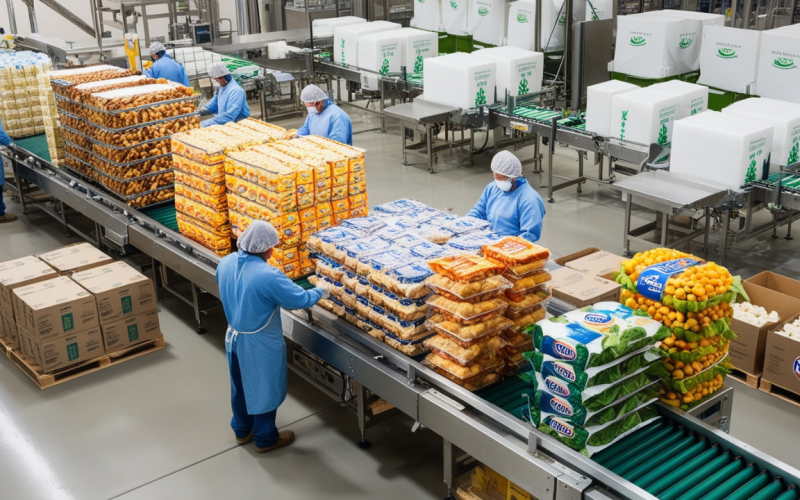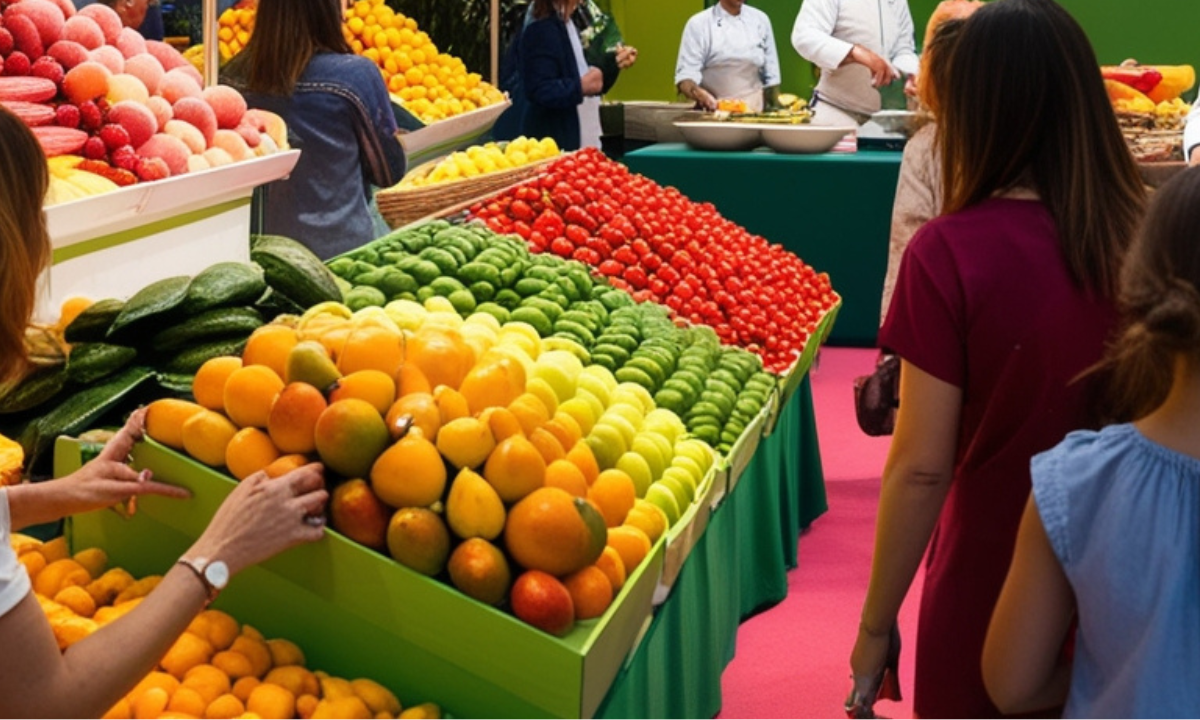Food Manufacturers in USA, The US food manufacturing industry is a powerhouse that fuels the economy, feeds millions, and sets standards in quality and safety worldwide.
This sector encompasses a wide range of food categories, from fresh dairy and meats to ready-to-eat snacks and beverages, and includes household names like Tyson Foods, PepsiCo, and Kraft Heinz.
These companies continuously innovate to meet changing consumer demands, introducing healthier options, eco-friendly packaging, and advanced food safety standards. In this article, we’ll dive into the main players in the industry, their specialties, challenges they face, and future trends.
Key Takeaways
- Gain insight into the leading food manufacturers and their product lines in the U.S.
- Learn how food companies are adapting to consumer demand for healthy and sustainable options.
- Discover the role of private label and contract manufacturers in the industry.
- Understand the importance of food safety and quality assurance in manufacturing.
- Explore future trends and technological advancements shaping the industry.
Overview of the Food Manufacturing Industry in the USA
The Role of Food Manufacturers in the USA
The U.S. food manufacturing industry is vital to the country’s economic health, generating billions in revenue and providing jobs across agriculture, logistics, and retail. By transforming raw ingredients into finished goods, these companies ensure that high-quality, diverse, and nutritious foods are available to millions of Americans every day.
Economic Impact of Food Manufacturing Companies
The industry’s economic influence goes beyond food production. By providing jobs in production, packaging, and distribution, food manufacturers play a crucial role in supporting regional economies. Leading companies like Tyson Foods and Kraft Heinz are responsible for employing thousands across the nation, contributing to the financial health of communities and boosting local economies.
Key Sectors in Food and Beverage Manufacturing
The U.S. food manufacturing industry includes a variety of sub-sectors, each catering to specific consumer needs. For instance, dairy products like cheese and yogurt are supplied by companies like Hilmar Cheese Company, while Tyson Foods and JBS USA dominate meat and poultry processing. Other specialized segments include pet food, beverages, and processed snacks, each bringing unique products and services to the table.
Food Manufacturing Trends (2021–2023)
Over recent years, shifts in consumer preferences, technological advancements, and environmental considerations have driven significant changes in the food manufacturing industry.
Impact of Consumer Preferences on Product Development
Today’s consumers are increasingly health-conscious, seeking food products that meet dietary and ethical standards. This shift has encouraged manufacturers to introduce product lines with reduced sugar, natural ingredients, and sustainable packaging solutions. The demand for plant-based products has seen substantial growth, with many companies now offering vegan and vegetarian options to cater to diverse dietary preferences.
US Food Manufacturing Market Highlights (2021–2023)
| Year | Major Trend | Notable Development |
|---|---|---|
| 2021 | Increased demand for healthy foods | Launch of low-calorie, natural products |
| 2022 | Focus on sustainable packaging | Shift to biodegradable packaging solutions |
| 2023 | Rise of plant-based foods | Expansion in plant-based meat and dairy substitutes |
Leading Food Manufacturers and Their Products
Top Food Manufacturing Companies in the United States
The U.S. is home to some of the world’s most influential food manufacturers. These companies produce a wide range of products and cater to diverse tastes and dietary preferences. Let’s explore a few key players:
Tyson Foods – A Leader in Meat Processing
Tyson Foods Inc. is a major supplier of chicken, beef, and pork products. Tyson’s reach extends far beyond the U.S., with exports that serve millions globally. Tyson has earned a reputation for its focus on quality, offering everything from raw meat cuts to processed products like sausages and nuggets.
The company also places emphasis on sustainability, implementing energy-saving practices in its plants and utilizing recyclable materials for packaging, aiming to reduce its environmental impact.
PepsiCo Inc. – Leader in Snacks and Beverages
PepsiCo is synonymous with popular snacks and drinks that have become part of everyday life for Americans. With brands like Quaker, Frito-Lay, and Gatorade, PepsiCo caters to nearly every consumer demographic.
PepsiCo has expanded its lineup to include low-calorie snacks, nutrient-enriched beverages, and organic product options, reflecting its responsiveness to health and wellness trends.
Furthermore, PepsiCo has set ambitious sustainability goals, including water conservation and the implementation of zero-waste packaging by 2030, underscoring its commitment to environmental responsibility.
Kraft Heinz and General Mills – Trusted Household Brands
Kraft Heinz and General Mills are both known for their iconic products, ranging from condiments to breakfast cereals. These companies have been successful in adapting to consumer trends, recently introducing organic options and products with fewer artificial ingredients.
As established brands, Kraft Heinz and General Mills emphasize transparency in sourcing and production practices, striving to align with consumer expectations for ethical and quality-driven food products.
The Rise of Private Label and Contract Manufacturing
Private labels have gained popularity as affordable alternatives to national brands. These private label products, often manufactured by contract companies, allow retailers to expand their offerings while keeping costs down. Contract manufacturers like Simplot and Hearthside Food Solutions provide co-packing services, handling production, packaging, and quality control, allowing brands to scale quickly and efficiently.
Leading Private Label and Contract Manufacturing Companies
| Company | Specialty | Notable Products |
|---|---|---|
| Hearthside | Co-packing | Bars, snacks, cereals |
| Simplot | Frozen food products | Vegetables, french fries |
Supply Chain Management in U.S. Food Manufacturing
Efficient supply chain management is essential for food manufacturers, as it impacts product availability, quality, and cost. Here’s how leading companies in the U.S. manage their supply chains to meet demand:
- Local Sourcing and Partnerships: Many manufacturers form partnerships with local farmers and suppliers to secure fresh ingredients, reduce transportation costs, and support regional economies.
- Advanced Logistics and Technology: Companies invest in technologies like AI and IoT to track shipments, optimize storage, and forecast demand, ensuring smooth and timely delivery.
- Inventory Management Systems: Real-time inventory systems allow manufacturers to manage stock levels, minimizing waste and reducing overproduction.
- Diversification of Suppliers: To minimize risks, many food manufacturers diversify their supplier base, ensuring continuity even if one source is disrupted.
Challenges and Innovations in Food Manufacturing
Current Challenges Facing Food Manufacturers
The food manufacturing industry faces numerous challenges, including stringent food safety regulations, evolving consumer demands, and disruptions in the supply chain. Maintaining food safety is critical, with companies investing heavily in monitoring, testing, and quality assurance processes to meet regulatory standards.
Ensuring Food Safety and Quality Assurance
Food safety protocols are essential in every stage of production, from ingredient sourcing to packaging and distribution. Many companies adopt systems like Hazard Analysis Critical Control Point (HACCP) to identify potential risks and prevent contamination.
This commitment to quality ensures that products meet high safety standards, reducing the risk of foodborne illnesses and maintaining consumer trust.
Addressing Supply Chain Disruptions
Supply chain disruptions have impacted the food manufacturing industry, affecting the availability of certain ingredients and causing delays. To address this, many companies are turning to local sourcing, building stronger partnerships with regional suppliers, and investing in advanced logistics technology. By improving supply chain resilience, manufacturers can respond more effectively to demand changes and ensure a consistent product supply.
Technological Advancements in Food Manufacturing
Technology is transforming food manufacturing, enhancing efficiency, safety, and sustainability. Automation, high-pressure processing, and advanced quality control systems are some of the innovations shaping the industry today.
For example, automated production lines reduce labor costs and minimize errors, while high-pressure processing helps preserve food quality without the need for preservatives.
Sustainable Practices and Eco-Friendly Packaging
Sustainability is a growing priority in the food manufacturing industry. Many companies are adopting eco-friendly packaging options, such as biodegradable materials and recyclable containers, to reduce waste and appeal to environmentally conscious consumers. Sustainable practices also extend to production, with manufacturers implementing energy-efficient technologies and reducing water usage to minimize their environmental footprint.
Product Categories and Major Brands in U.S. Food Manufacturing
Dairy Products and Leading Dairy Brands
Dairy products are a significant part of the U.S. food industry, with companies like Hilmar Cheese Company producing a variety of items, from milk and yogurt to specialty cheeses. These brands emphasize quality and often source ingredients locally, supporting sustainable agriculture and ensuring freshness.
Meat and Poultry Processing Leaders (Tyson Foods, JBS USA)
Companies like Tyson Foods and JBS USA are known for their high standards in meat and poultry processing. These companies offer a range of fresh and frozen products, ensuring availability across different markets and maintaining rigorous quality control to meet consumer expectations for safety and taste.
Sustainability Initiatives in the Food Manufacturing Industry
Sustainability is increasingly important in the food industry, with companies adopting eco-friendly practices. Here are some ways U.S. food manufacturers are reducing their environmental impact:
- Eco-Friendly Packaging: Many companies are switching to recyclable and biodegradable packaging materials to reduce waste.
- Energy-Efficient Production: Manufacturers invest in energy-saving technologies and renewable energy sources to lower their carbon footprint.
- Waste Reduction Programs: By recycling, composting, and repurposing food waste, companies aim to reduce landfill contributions.
- Water Conservation: Food manufacturers are implementing water-saving practices in processing plants to reduce usage and support environmental sustainability.
Consumer-Driven Trends and the Future of Food Manufacturing
Meeting Consumer Demands in a Dynamic Market
The demand for healthier, fresher, and more sustainable food options is driving changes in the food manufacturing industry. Companies are focusing on transparency in sourcing, ingredient quality, and innovative packaging to align with these consumer preferences.
Health and Wellness Trends in Food Production
Health and wellness trends continue to shape the food industry. Many manufacturers now offer organic, non-GMO, and allergen-free options to cater to specific dietary needs. By focusing on clean ingredients and nutrient-dense products, these companies are meeting the demand for healthier choices.
Future Outlook for the U.S. Food Manufacturing Industry
The future of the U.S. food manufacturing industry is marked by technological advancements and a commitment to sustainability. As companies invest in new technologies and adopt environmentally friendly practices, they are well-positioned to address challenges and meet the evolving demands of consumers.
FAQs about Food Manufacturers in USA
1. What are the top food manufacturing companies in the U.S.?
Some of the leading food manufacturers in the U.S. include Tyson Foods, PepsiCo, Kraft Heinz, General Mills, and Mondelez International. These companies produce a wide range of products, from meats and dairy to snacks and beverages.
2. How do food manufacturers ensure product quality and safety?
Food manufacturers follow stringent safety standards, such as HACCP and FDA regulations. Quality control measures, regular inspections, and testing protocols ensure that products are safe and meet industry standards.
3. What role do contract manufacturers play in the food industry?
Contract manufacturers produce and package food items for other brands, allowing companies to bring products to market without owning manufacturing facilities. They are essential for private label brands and help companies scale production efficiently.
4. How is the food manufacturing industry becoming more sustainable?
The industry is embracing sustainable practices like eco-friendly packaging, energy-efficient production, waste reduction, and water conservation. Many companies are setting environmental goals to meet the demand for sustainable products and reduce their carbon footprint.
My Opinion
The U.S. food manufacturing industry is a diverse and dynamic sector, driven by innovation and a commitment to quality. From dairy products to processed snacks, American manufacturers like Tyson Foods, PepsiCo, and Kraft Heinz play an essential role in supplying high-quality food to consumers. As the industry evolves, it continues to prioritize safety, sustainability, and consumer satisfaction, ensuring a resilient future for food production in the United States.






